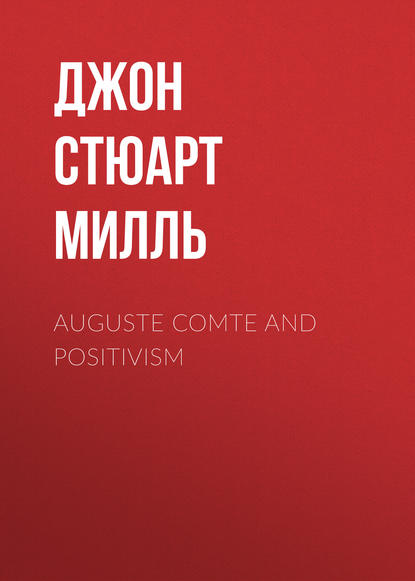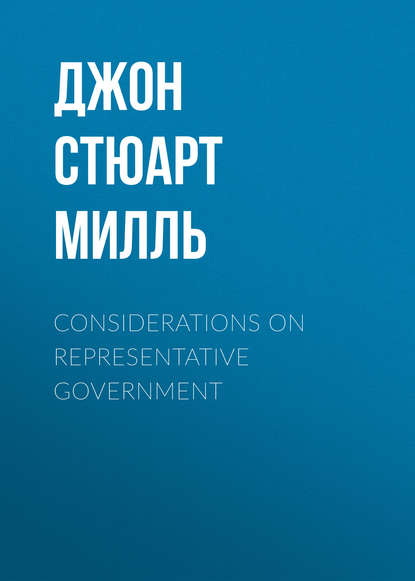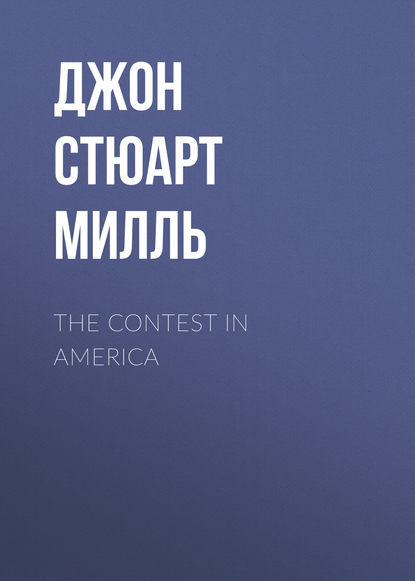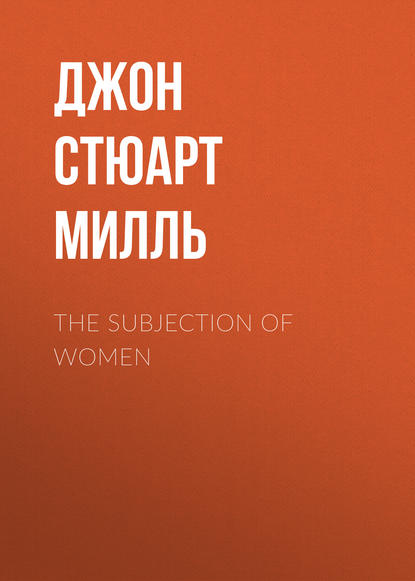 Полная версия
Полная версияПолная версия:
Джон Стюарт Милль Auguste Comte and Positivism
- + Увеличить шрифт
- - Уменьшить шрифт

John Stuart Mill
Auguste Comte and Positivism
PART I.
THE COURS DE PHILOSOPHIE POSITIVE
For some time much has been said, in England and on the Continent, concerning "Positivism" and "the Positive Philosophy." Those phrases, which during the life of the eminent thinker who introduced them had made their way into no writings or discussions but those of his very few direct disciples, have emerged from the depths and manifested themselves on the surface of the philosophy of the age. It is not very widely known what they represent, but it is understood that they represent something. They are symbols of a recognised mode of thought, and one of sufficient importance to induce almost all who now discuss the great problems of philosophy, or survey from any elevated point of view the opinions of the age, to take what is termed the Positivist view of things into serious consideration, and define their own position, more or less friendly or hostile, in regard to it. Indeed, though the mode of thought expressed by the terms Positive and Positivism is widely spread, the words themselves are, as usual, better known through the enemies of that mode of thinking than through its friends; and more than one thinker who never called himself or his opinions by those appellations, and carefully guarded himself against being confounded with those who did, finds himself, sometimes to his displeasure, though generally by a tolerably correct instinct, classed with Positivists, and assailed as a Positivist. This change in the bearings of philosophic opinion commenced in England earlier than in France, where a philosophy of a contrary kind had been more widely cultivated, and had taken a firmer hold on the speculative minds of a generation formed by Royer-Collard, Cousin, Jouffroy, and their compeers. The great treatise of M. Comte was scarcely mentioned in French literature or criticism, when it was already working powerfully on the minds of many British students and thinkers. But, agreeably to the usual course of things in France, the new tendency, when it set in, set in more strongly. Those who call themselves Positivists are indeed not numerous; but all French writers who adhere to the common philosophy, now feel it necessary to begin by fortifying their position against "the Positivist school." And the mode of thinking thus designated is already manifesting its importance by one of the most unequivocal signs, the appearance of thinkers who attempt a compromise or juste milieu between it and its opposite. The acute critic and metaphysician M. Taine, and the distinguished chemist M. Berthelot, are the authors of the two most conspicuous of these attempts.
The time, therefore, seems to have come, when every philosophic thinker not only ought to form, but may usefully express, a judgment respecting this intellectual movement; endeavouring to understand what it is, whether it is essentially a wholesome movement, and if so, what is to be accepted and what rejected of the direction given to it by its most important movers. There cannot be a more appropriate mode of discussing these points than in the form of a critical examination of the philosophy of Auguste Comte; for which the appearance of a new edition of his fundamental treatise, with a preface by the most eminent, in every point of view, of his professed disciples, M. Littré, affords a good opportunity. The name of M. Comte is more identified than any other with this mode of thought. He is the first who has attempted its complete systematization, and the scientific extension of it to all objects of human knowledge. And in doing this he has displayed a quantity and quality of mental power, and achieved an amount of success, which have not only won but retained the high admiration of thinkers as radically and strenuously opposed as it is possible to be, to nearly the whole of his later tendencies, and to many of his earlier opinions. It would have been a mistake had such thinkers busied themselves in the first instance with drawing attention to what they regarded as errors in his great work. Until it had taken the place in the world of thought which belonged to it, the important matter was not to criticise it, but to help in making it known. To have put those who neither knew nor were capable of appreciating the greatness of the book, in possession of its vulnerable points, would have indefinitely retarded its progress to a just estimation, and was not needful for guarding against any serious inconvenience. While a writer has few readers, and no influence except on independent thinkers, the only thing worth considering in him is what he can teach us: if there be anything in which he is less wise than we are already, it may be left unnoticed until the time comes when his errors can do harm. But the high place which M. Comte has now assumed among European thinkers, and the increasing influence of his principal work, while they make it a more hopeful task than before to impress and enforce the strong points of his philosophy, have rendered it, for the first time, not inopportune to discuss his mistakes. Whatever errors he may have fallen into are now in a position to be injurious, while the free exposure of them can no longer be so.
We propose, then, to pass in review the main principles of M. Comte's philosophy; commencing with the great treatise by which, in this country, he is chiefly known, and postponing consideration of the writings of the last ten years of his life, except for the occasional illustration of detached points.
When we extend our examination to these later productions, we shall have, in the main, to reverse our judgment. Instead of recognizing, as in the Cours de Philosophic Positive, an essentially sound view of philosophy, with a few capital errors, it is in their general character that we deem the subsequent speculations false and misleading, while in the midst of this wrong general tendency, we find a crowd of valuable thoughts, and suggestions of thought, in detail. For the present we put out of the question this signal anomaly in M. Comte's intellectual career. We shall consider only the principal gift which he has left to the world, his clear, full, and comprehensive exposition, and in part creation, of what he terms the Positive Philosophy: endeavouring to sever what in our estimation is true, from the much less which is erroneous, in that philosophy as he conceived it, and distinguishing, as we proceed, the part which is specially his, from that which belongs to the philosophy of the age, and is the common inheritance of thinkers. This last discrimination has been partially made in a late pamphlet, by Mr Herbert Spencer, in vindication of his own independence of thought: but this does not diminish the utility of doing it, with a less limited purpose, here; especially as Mr Spencer rejects nearly all which properly belongs to M. Comte, and in his abridged mode of statement does scanty justice to what he rejects. The separation is not difficult, even on the direct evidence given by M. Comte himself, who, far from claiming any originality not really belonging to him, was eager to connect his own most original thoughts with every germ of anything similar which he observed in previous thinkers.
The fundamental doctrine of a true philosophy, according to M. Comte, and the character by which he defines Positive Philosophy, is the following: – We have no knowledge of anything but Phaenomena; and our knowledge of phaenomena is relative, not absolute. We know not the essence, nor the real mode of production, of any fact, but only its relations to other facts in the way of succession or of similitude. These relations are constant; that is, always the same in the same circumstances. The constant resemblances which link phaenomena together, and the constant sequences which unite them as antecedent and consequent, are termed their laws. The laws of phaenomena are all we know respecting them. Their essential nature, and their ultimate causes, either efficient or final, are unknown and inscrutable to us.
M. Comte claims no originality for this conception of human knowledge. He avows that it has been virtually acted on from the earliest period by all who have made any real contribution to science, and became distinctly present to the minds of speculative men from the time of Bacon, Descartes, and Galileo, whom he regards as collectively the founders of the Positive Philosophy. As he says, the knowledge which mankind, even in the earliest ages, chiefly pursued, being that which they most needed, was foreknowledge: "savoir, pour prevoir." When they sought for the cause, it was mainly in order to control the effect or if it was uncontrollable, to foreknow and adapt their conduct to it. Now, all foresight of phaenomena, and power over them, depend on knowledge of their sequences, and not upon any notion we may have formed respecting their origin or inmost nature. We foresee a fact or event by means of facts which are signs of it, because experience has shown them to be its antecedents. We bring about any fact, other than our own muscular contractions, by means of some fact which experience has shown to be followed by it. All foresight, therefore, and all intelligent action, have only been possible in proportion as men have successfully attempted to ascertain the successions of phaenomena. Neither foreknowledge, nor the knowledge which is practical power, can be acquired by any other means.
The conviction, however, that knowledge of the successions and co-existences of phaenomena is the sole knowledge accessible to us, could not be arrived at in a very early stage of the progress of thought. Men have not even now left off hoping for other knowledge, nor believing that they have attained it; and that, when attained, it is, in some undefinable manner, greatly more precious than mere knowledge of sequences and co-existences. The true doctrine was not seen in its full clearness even by Bacon, though it is the result to which all his speculations tend: still less by Descartes. It was, however, correctly apprehended by Newton.1
But it was probably first conceived in its entire generality by Hume, who carries it a step further than Comte, maintaining not merely that the only causes of phaenomena which can be known to us are other phaenomena, their invariable antecedents, but that there is no other kind of causes: cause, as he interprets it, means the invariable antecedent. This is the only part of Hume's doctrine which was contested by his great adversary, Kant; who, maintaining as strenuously as Comte that we know nothing of Things in themselves, of Noumena, of real Substances and real Causes, yet peremptorily asserted their existence. But neither does Comte question this: on the contrary, all his language implies it. Among the direct successors of Hume, the writer who has best stated and defended Comte's fundamental doctrine is Dr Thomas Brown. The doctrine and spirit of Brown's philosophy are entirely Positivist, and no better introduction to Positivism than the early part of his Lectures has yet been produced. Of living thinkers we do not speak; but the same great truth formed the groundwork of all the speculative philosophy of Bentham, and pre-eminently of James Mill: and Sir William Hamilton's famous doctrine of the Relativity of human knowledge has guided many to it, though we cannot credit Sir William Hamilton himself with having understood the principle, or been willing to assent to it if he had.
The foundation of M. Comte's philosophy is thus in no way peculiar to him, but the general property of the age, however far as yet from being universally accepted even by thoughtful minds.
The philosophy called Positive is not a recent invention of M. Comte, but a simple adherence to the traditions of all the great scientific minds whose discoveries have made the human race what it is. M. Comte has never presented it in any other light. But he has made the doctrine his own by his manner of treating it. To know rightly what a thing is, we require to know, with equal distinctness, what it is not. To enter into the real character of any mode of thought, we must understand what other modes of thought compete with it. M. Comte has taken care that we should do so. The modes of philosophizing which, according to him, dispute ascendancy with the Positive, are two in number, both of them anterior to it in date; the Theological, and the Metaphysical.
We use the words Theological, Metaphysical, and Positive, because they are chosen by M. Comte as a vehicle for M. Comte's ideas. Any philosopher whose thoughts another person undertakes to set forth, has a right to require that it should be done by means of his own nomenclature. They are not, however, the terms we should ourselves choose. In all languages, but especially in English, they excite ideas other than those intended. The words Positive and Positivism, in the meaning assigned to them, are ill fitted to take, root in English soil; while Metaphysical suggests, and suggested even to M. Comte, much that in no way deserves to be included in his denunciation. The term Theological is less wide of the mark, though the use of it as a term of condemnation implies, as we shall see, a greater reach of negation than need be included in the Positive creed. Instead of the Theological we should prefer to speak of the Personal, or Volitional explanation of nature; instead of Metaphysical, the Abstractional or Ontological: and the meaning of Positive would be less ambiguously expressed in the objective aspect by Phaenomenal, in the subjective by Experiential. But M. Comte's opinions are best stated in his own phraseology; several of them, indeed, can scarcely be presented in some of their bearings without it.
The Theological, which is the original and spontaneous form of thought, regards the facts of the universe as governed not by invariable laws of sequence, but by single and direct volitions of beings, real or imaginary, possessed of life and intelligence. In the infantile state of reason and experience, individual objects are looked upon as animated. The next step is the conception of invisible beings, each of whom superintends and governs an entire class of objects or events. The last merges this multitude of divinities in a single God, who made the whole universe in the beginning, and guides and carries on its phaenomena by his continued action, or, as others think, only modifies them from time to time by special interferences.
The mode of thought which M. Comte terms Metaphysical, accounts for phaenomena by ascribing them, not to volitions either sublunary or celestial, but to realized abstractions. In this stage it is no longer a god that causes and directs each of the various agencies of nature: it is a power, or a force, or an occult quality, considered as real existences, inherent in but distinct from the concrete bodies in which they reside, and which they in a manner animate. Instead of Dryads presiding over trees, producing and regulating their phaenomena, every plant or animal has now a Vegetative Soul, the θρεπτίκη ψυχή of Aristotle. At a later period the Vegetative Soul has become a Plastic Force, and still later, a Vital Principle. Objects now do all that they do because it is their Essence to do so, or by reason of an inherent Virtue. Phaenomena are accounted for by supposed tendencies and propensities of the abstraction Nature; which, though regarded as impersonal, is figured as acting on a sort of motives, and in a manner more or less analogous to that of conscious beings. Aristotle affirms a tendency of nature towards the best, which helps him to a theory of many natural phaenomena. The rise of water in a pump is attributed to Nature's horror of a vacuum. The fall of heavy bodies, and the ascent of flame and smoke, are construed as attempts of each to get to its natural place. Many important consequences are deduced from the doctrine that Nature has no breaks (non habet saltum). In medicine the curative force (vis medicatrix) of Nature furnishes the explanation of the reparative processes which modern physiologists refer each to its own particular agencies and laws.
Examples are not necessary to prove to those who are acquainted with the past phases of human thought, how great a place both the theological and the metaphysical interpretations of phaenomena have historically occupied, as well in the speculations of thinkers as in the familiar conceptions of the multitude. Many had perceived before M. Comte that neither of these modes of explanation was final: the warfare against both of them could scarcely be carried on more vigorously than it already was, early in the seventeenth century, by Hobbes. Nor is it unknown to any one who has followed the history of the various physical sciences, that the positive explanation of facts has substituted itself, step by step, for the theological and metaphysical, as the progress of inquiry brought to light an increasing number of the invariable laws of phaenomena. In these respects M. Comte has not originated anything, but has taken his place in a fight long since engaged, and on the side already in the main victorious. The generalization which belongs to himself, and in which he had not, to the best of our knowledge, been at all anticipated, is, that every distinct class of human conceptions passes through all these stages, beginning with the theological, and proceeding through the metaphysical to the positive: the metaphysical being a mere state of transition, but an indispensable one, from the theological mode of thought to the positive, which is destined finally to prevail, by the universal recognition that all phaemomena without exception are governed by invariable laws, with which no volitions, either natural or supernatural, interfere. This general theorem is completed by the addition, that the theological mode of thought has three stages, Fetichism, Polytheism, and Monotheism: the successive transitions being prepared, and indeed caused, by the gradual uprising of the two rival modes of thought, the metaphysical and the positive, and in their turn preparing the way for the ascendancy of these; first and temporarily of the metaphysical, finally of the positive.
This generalization is the most fundamental of the doctrines which originated with M. Comte; and the survey of history, which occupies the two largest volumes of the six composing his work, is a continuous exemplification and verification of the law. How well it accords with the facts, and how vast a number of the greater historical phaenomena it explains, is known only to those who have studied its exposition, where alone it can be found – in these most striking and instructive volumes. As this theory is the key to M. Comte's other generalizations, all of which arc more or less dependent on it; as it forms the backbone, if we may so speak, of his philosophy, and, unless it be true, he has accomplished little; we cannot better employ part of our space than in clearing it from misconception, and giving the explanations necessary to remove the obstacles which prevent many competent persons from assenting to it.
It is proper to begin by relieving the doctrine from a religious prejudice. The doctrine condemns all theological explanations, and replaces them, or thinks them destined to be replaced, by theories which take no account of anything but an ascertained order of phaenomena. It is inferred that if this change were completely accomplished, mankind would cease to refer the constitution of Nature to an intelligent will or to believe at all in a Creator and supreme Governor of the world. This supposition is the more natural, as M. Comte was avowedly of that opinion. He indeed disclaimed, with some acrimony, dogmatic atheism, and even says (in a later work, but the earliest contains nothing at variance with it) that the hypothesis of design has much greater verisimilitude than that of a blind mechanism. But conjecture, founded on analogy, did not seem to him a basis to rest a theory on, in a mature state of human intelligence. He deemed all real knowledge of a commencement inaccessible to us, and the inquiry into it an overpassing of the essential limits of our mental faculties. To this point, however, those who accept his theory of the progressive stages of opinion are not obliged to follow him. The Positive mode of thought is not necessarily a denial of the supernatural; it merely throws back that question to the origin of all things. If the universe had a beginning, its beginning, by the very conditions of the case, was supernatural; the laws of nature cannot account for their own origin. The Positive philosopher is free to form his opinion on the subject, according to the weight he attaches to the analogies which are called marks of design, and to the general traditions of the human race. The value of these evidences is indeed a question for Positive philosophy, but it is not one upon which Positive philosophers must necessarily be agreed. It is one of M. Comte's mistakes that he never allows of open questions. Positive Philosophy maintains that within the existing order of the universe, or rather of the part of it known to us, the direct determining cause of every phaenomenon is not supernatural but natural. It is compatible with this to believe, that the universe was created, and even that it is continuously governed, by an Intelligence, provided we admit that the intelligent Governor adheres to fixed laws, which are only modified or counteracted by other laws of the same dispensation, and are never either capriciously or providentially departed from. Whoever regards all events as parts of a constant order, each one being the invariable consequent of some antecedent condition, or combination of conditions, accepts fully the Positive mode of thought: whether he acknowledges or not an universal antecedent on which the whole system of nature was originally consequent, and whether that universal antecedent is conceived as an Intelligence or not.
There is a corresponding misconception to be corrected respecting the Metaphysical mode of thought. In repudiating metaphysics, M. Comte did not interdict himself from analysing or criticising any of the abstract conceptions of the mind. He was not ignorant (though he sometimes seemed to forget) that such analysis and criticism are a necessary part of the scientific process, and accompany the scientific mind in all its operations. What he condemned was the habit of conceiving these mental abstractions as real entities, which could exert power, produce phaenomena, and the enunciation of which could be regarded as a theory or explanation of facts. Men of the present day with difficulty believe that so absurd a notion was ever really entertained, so repugnant is it to the mental habits formed by long and assiduous cultivation of the positive sciences. But those sciences, however widely cultivated, have never formed the basis of intellectual education in any society. It is with philosophy as with religion: men marvel at the absurdity of other people's tenets, while exactly parallel absurdities remain in their own, and the same man is unaffectedly astonished that words can be mistaken for things, who is treating other words as if they were things every time he opens his mouth to discuss. No one, unless entirely ignorant of the history of thought, will deny that the mistaking of abstractions for realities pervaded speculation all through antiquity and the middle ages. The mistake was generalized and systematized in the famous Ideas of Plato. The Aristotelians carried it on. Essences, quiddities, virtues residing in things, were accepted as a bonâ fide explanation of phaenomena. Not only abstract qualities, but the concrete names of genera and species, were mistaken for objective existences. It was believed that there were General Substances corresponding to all the familiar classes of concrete things: a substance Man, a substance Tree, a substance Animal, which, and not the individual objects so called, were directly denoted by those names. The real existence of Universal Substances was the question at issue in the famous controversy of the later middle ages between Nominalism and Realism, which is one of the turning points in the history of thought, being its first struggle to emancipate itself from the dominion of verbal abstractions. The Realists were the stronger party, but though the Nominalists for a time succumbed, the doctrine they rebelled against fell, after a short interval, with the rest of the scholastic philosophy. But while universal substances and substantial forms, being the grossest kind of realized abstractions, were the soonest discarded, Essences, Virtues, and Occult Qualities long survived them, and were first completely extruded from real existence by the Cartesians. In Descartes' conception of science, all physical phaenomena were to be explained by matter and motion, that is, not by abstractions but by invariable physical laws: though his own explanations were many of them hypothetical, and turned out to be erroneous. Long after him, however, fictitious entities (as they are happily termed by Bentham) continued to be imagined as means of accounting for the more mysterious phaenomena; above all in physiology, where, under great varieties of phrase, mysterious forces and principles were the explanation, or substitute for explanation, of the phaenomena of organized beings. To modern philosophers these fictions are merely the abstract names of the classes of phaenomena which correspond to them; and it is one of the puzzles of philosophy, how mankind, after inventing a set of mere names to keep together certain combinations of ideas or images, could have so far forgotten their own act as to invest these creations of their will with objective reality, and mistake the name of a phaenomenon for its efficient cause. What was a mystery from the purely dogmatic point of view, is cleared up by the historical. These abstract words are indeed now mere names of phaenomena, but were not so in their origin. To us they denote only the phaenomena, because we have ceased to believe in what else they once designated; and the employment of them in explanation is to us evidently, as M. Comte says, the naïf reproduction of the phaenomenon as the reason for itself: but it was not so in the beginning. The metaphysical point of view was not a perversion of the positive, but a transformation of the theological. The human mind, in framing a class of objects, did not set out from the notion of a name, but from that of a divinity. The realization of abstractions was not the embodiment of a word, but the gradual disembodiment of a Fetish.







